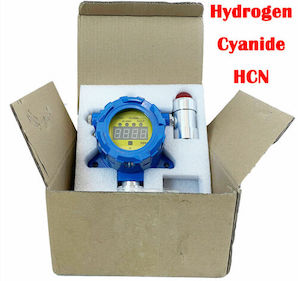
-----
Physical properties of Sodium Cyanide. Where to get? Why does it get hard?
Q. We require Physical properties of Sodium Cyanide and chemical resistance of that fluid. We require the Vapor Pressure, Critical Pressure, Density and Viscosity. We also require the chemical resistance of it for different metals and Brass & Bronze and possible certain plastic materials also. Do you have this type of information or do you know where we can find it.
Regards,
Loraine Lundall- Pretoria, Gauteng, South Africa
2003
A. Sodium cyanide is a solid and not a fluid. If you make a solution, then it depends on what is in the solution to get the information that you are asking about. Tell us the rest of the story, and someone might be able to help you get the information you require.
James Watts- Navarre, Florida
2003
A. You usually encounter NaCN as a component of a solution or as a solid (melting point 563.7 °C). For anything further, you need to give a little more data (temp, %NaCN, etc.).

James Totter, CEF
- Tallahassee, Florida
2003
Q. More information in regards to Sodium Cyanide application:
The NaCN is a liquid at a temperature of 25 °C.
If you know where to find Vapor Pressure Charts and Critical Pressures. It would be appreciated. We are also in need of corrosive compatibility charts for metals and soft materials used in sodium cyanide.
Loraine Lundall- Pretoria, Gauteng, South Africa
2003
A. 1) For data on NaCN, see an MSDS (from your supplier or Internet) or a CRC Handbook of Chemistry & Physics [adv: on Amazon & AbeBooks & eBay affil links] of Chemistry and Physics. Misters Watts & Trotter are correct that NaCN is solid at 25 °C; my sources indicate it melts at 563.7 °C and boils at 1496 °C (with irritating, corrosive and toxic fumes). Density 1.6 g/cc. Vapor pressure: 10 Pascals at 672 °C increasing to 0.1 MPa at 1497 °C. Also, it absorbs water from humid air; this perhaps begat your belief that it was a liquid.
2) Incompatible with brass, bronze, copper and silver; sodium cyanide solutions can be used to strip plating of these metals.
3) NaCN is very toxic via skin contact, respiration of particles or mist from solutions, and can form the even more toxic hydrogen cyanide gas in acidic solutions. There are very strict rules in the US and Europe to protect workers in the presence of NaCN. For example, protective eyeglasses or chemical safety goggles ⇦ on eBay or Amazon [affil link] as described by OSHA's eye and face protection regulations in 29 CFR 1910.133 or European Standard EN166. Respiratory protection per OSHA's 29 CFR §1910.134 and ANSI Z88.2 requirements or European Standard EN 149. Your government probably has similar regulations. I strongly advise not using this substance until you have both adequate personal protective equipment and training from an accredited safety specialist.
4) Eventually, a used sodium cyanide solution becomes hazardous waste. The US EPA has strict laws regarding treatment, permits, disposal, etc. Investigate South Africa's rules; maybe talk to a government environmental agent or a gold mining company.
Ken Vlach [deceased]- Goleta, California
Rest in peace, Ken. Thank you for your hard work which the finishing world, and we at finishing.com, continue to benefit from.
2003
Q. Hi,
I would like to know the crystal density of NaCN. Please let me know if you have this information or a possible alternative source.
Thank you,
Nina Bastino- NSW, Australia
2003
A. Hi Nina. Unless I am misunderstanding, Ken just told us that the density is 1.6 g/cc.
Regards,

Ted Mooney, P.E.
Striving to live Aloha
finishing.com - Pine Beach, New Jersey
Ted is available for instant help
or longer-term assistance.
Q. I would like to know at what temperature NaCN starts to break down in the elution process of gold from carbon.
Gerrit Geldenhuissmall scale miner - Karoi, Zimbabwe
August 2, 2011
2004
RFQ WE ARE INTERESTED TO IMPORT SODIUM CYANIDE FCL - 20 ' CONTAINER PL INFORM PACKING AND PRICES C&F KARACHI. PAYMENT BY L/C AT SIGHT.
Mughees Q [last name deleted for privacy by Editor]plating shop - LAHORE, Punjab, PAKISTAN
Ed. note: This RFQ is outdated, but technical replies are welcome, and readers are encouraged to post their own RFQs. But no public commercial suggestions please ( huh? why?).
2004
RFQ I am looking for a small quantity of sodium cyanide to restore gold & silver jewelry.
M Nowlan [last name deleted for privacy by Editor]jewelry - Naples, Florida, US
Ed. note: This RFQ is outdated, but technical replies are welcome, and readers are encouraged to post their own RFQs. But no public commercial suggestions please ( huh? why?).
|
RFQ I am a small independent jeweler looking for sodium cyanide to clean tarnish from gold & silver jewelry. Where can I buy cyanide? Ed. note: This RFQ is outdated, but technical replies are welcome, and readers are encouraged to post their own RFQs. But no public commercial suggestions please ( huh? why?). RFQ I am in a similar situation. Sincerely, Jeff G. [last name deleted for privacy by Editor]- Raleigh, North Carolina Ed. note: This RFQ is outdated, but technical replies are welcome, and readers are encouraged to post their own RFQs. But no public commercial suggestions please ( huh? why?). RFQ I am in need of a small quantity also... thanks, Ed. note: This RFQ is outdated, but technical replies are welcome, and readers are encouraged to post their own RFQs. But no public commercial suggestions please ( huh? why?). RFQ Starting an at-home jewelry business and require this for my creations. Ed. note: This RFQ is outdated, but technical replies are welcome, and readers are encouraged to post their own RFQs. But no public commercial suggestions please ( huh? why?). RFQ I am a small independent jeweler looking for sodium cyanide to clean tarnish from gold & silver jewelry. Ed. note: This RFQ is outdated, but technical replies are welcome, and readers are encouraged to post their own RFQs. But no public commercial suggestions please ( huh? why?). |
A. Hi, folks.
Most "plating supplies" distributors should have it. Look in our Directory of Chemicals or in your local yellow pages. Good luck.
Regards,

Ted Mooney, P.E.
Striving to live Aloha
finishing.com - Pine Beach, New Jersey
Ted is available for instant help
or longer-term assistance.
March 11, 2011
RFQ I require 2 x 1 ounce samples of potassium cyanide. I wish to purchase large quantities for my new plant.
Regards,
Mike R [last name deleted for privacy by Editor]- Wigan, Lancashire, England
2002
Ed. note: This RFQ is outdated, but technical replies are welcome, and readers are encouraged to post their own RFQs. But no public commercial suggestions please ( huh? why?).
|
RFQ Small Quantities of Potassium cyanide. For a small at home Jewelry Fashion Business. Ed. note: This RFQ is outdated, but technical replies are welcome, and readers are encouraged to post their own RFQs. But no public commercial suggestions please ( huh? why?). RFQ Hi, I am looking for 100 mg of potassium cyanide. I like to know any vendor in India who can offer me 100 mg of potassium cyanide. Thanks, Ed. note: This RFQ is outdated, but technical replies are welcome, and readers are encouraged to post their own RFQs. But no public commercial suggestions please ( huh? why?). RFQ Potassium cyanide needed for jeweler located in Anchorage, AK Ed. note: This RFQ is outdated, but technical replies are welcome, and readers are encouraged to post their own RFQs. But no public commercial suggestions please ( huh? why?). RFQ We need small amount of Potassium Cyanide(KCN) for tin types. Ed. note: This RFQ is outdated, but technical replies are welcome, and readers are encouraged to post their own RFQs. But no public commercial suggestions please ( huh? why?). RFQ We are a small mining operation in southern CA. We mine the raw material, crush it, place in a sluice flood with water and when the cyanide is added it causes the gold/silver to float free of the debris. Once we have an adequate amount of gold, sodium nitrate
⇦ on
Amazon [affil link]
is used to remove the gold. As you can see your chemical in vital to the effective operation of our business. Thank You, Ed. note: This RFQ is outdated, but technical replies are welcome, and readers are encouraged to post their own RFQs. But no public commercial suggestions please ( huh? why?). |
Sodium cyanide gets rock hard
Q. Here is the problem.....our company buys sodium cyanide in 100 pound containers, the container itself I believe is steel. The cyanide is in a clear plastic bag. When we open it, after a few days the cyanide gets rock hard (it's the granular form) and is a pain to scoop out of the container, we twist the bag and replace the lid that comes with the container but this does not help at all, if anyone has any solutions or suggestions I would gladly welcome them.
Brian Gaylets- Scranton, Pennsylvania, U.S.A.
2005
A. Sounds like you have a moisture problem. Had a similar problem when I worked packaging roofing sealants. We used a shot of Nitrogen before capping off the 5 gal. containers. If Nitrogen doesn't react with the cyanide you could do the same. Before closing the plastic bag try a shot of Nitrogen. It neutralized the moisture for us.
Hope this helps,
Fred Read- Duluth, Minnesota, USA
2005
Test for potassium vs. sodium cyanide
Q. Hi
can anybody tell me a simple test for Distinguish b/w sodium and potassium cyanide?
thanks,
chemist - Karachi, Pakistan
2007
A. If you know that it has to be one or the other and you know you have pure materials, then how about density?
Terry Tomt- Auburn, Washington
2007
2007
A. Dissolve a gram in 10% NaOH, and titrate with AgNO3, KI indicator to an opalescent white endpoint.
Then, determine the equivalent weight. That should make it obvious which you have.

Dave Wichern
Consultant - The Bronx, New York
A. The traditional flame test is simple and quite specific.
Clean a piece of platinum wire (nichrome will do ) Dissolve a small crystal of the material and dip the tip of the wire in.
Hold the wire in a bunsen flame. Sodium gives an intense yellow colour to the flame and potassium colors it lilac (pale blue). Don't they teach this on chemistry courses these days?

Geoff Smith
Hampshire, England
2007
Q, A, or Comment on THIS thread -or- Start a NEW Thread
